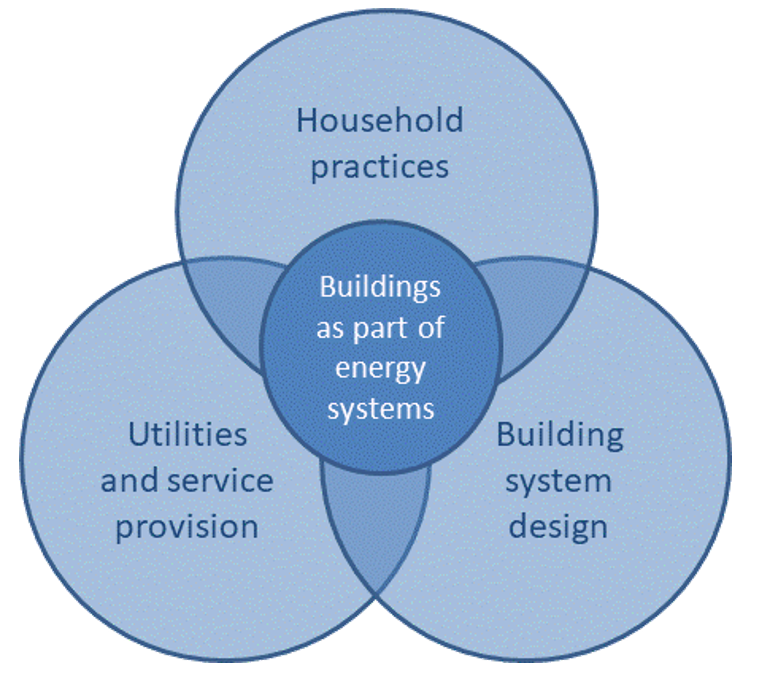BACKGROUND
Reducing carbon dioxide emissions to ensure a future with “Intelligent, Sustainable, and Integrated Energy Production and Consumption” calls for changing the existing energy system to include an increased share of fluctuating renewable energy sources. Integrating these energy sources in the energy system will call for developing more flexible energy systems, and overall reduction of consumption. This can be achieved by integrating buildings into the energy system, making them part of the energy infrastructure. This will have implications for everyday household practices, the ways in which buildings and their associated technologies are designed and for the ways in which energy providers operate. The InterHUB projects focuses on changes within and across these three domains.
With an increased reliance on intermittent energy sources, the technical, institutional and organizational configuration of the energy system is in a state of flux. The roles of the involved actors are also changing, e.g. utilities becoming service providers rather than energy providers, consumers taking roles of prosumers (both providing and consuming energy), and buildings serving as energy storage units and energy producing units. Although the extent and implications of these changes are far from certain, it will, however, call for increased collaboration and an aligning of practices across each of these domains, as indicated in figure 1. Thus, central research topics to be investigated are: how households interact with and understand different types of building technologies, how households relate to utilities providing different services, how different types of professionals communicate with each other and with households on energy issues, and how developments within buildings and provision systems influence each other. Each of these topics has implications for the chances of lowering energy demand and for the ways in which buildings will be integrated into the energy infrastructure.

Figure: Three key domains in integrating buildings into energy systems
The lack of interdisciplinary research on the integration of buildings into the energy system is a major scientific challenge for transitioning to a low carbon future. There are substantial bodies of research within each of these three domains in relation to intermittent energy, particularly with regard to technology and systems development. There is also a growing amount of humanistic and social science research on infrastructure development and households practices. What is missing, however, are studies focusing on the integration of all three domains and the interrelations between them, where insights from the humanities and social science can help form the development of new technological solutions, and insights from building engineering can provide input to developments within energy provision.
InterHUB is an interdisciplinary research project that combines expertise from engineering, social sciences and the humanities, and has an action approach to conducting research that involves engaging with actors in the field. This is not only valuable for developing alternatives to existing practices, technologies and systems but also for feeding insights into each of our respective disciplines.
Aalborg University has a strong national and international research position within the built environment as well as within energy studies, including the role of users and households. By combining these approaches, and by drawing on insights from the humanities, InterHUB will place AAU in a very strong position nationally as well as internationally as regard energy research on the role of buildings in an energy system with intermittent energy. The project will be able to develop new synergies and utilise these to influence future calls from EU and national research bodies, and subsequently be in a strong position to respond to these calls.
The InterHUB project will build upon the state-of-art from each of the abovementioned research areas and will seek to provide insights to further develop these disciplinary domains. However, InterHUB will primarily go in new directions by combining insights from across disciplines and developing an interdisciplinary approach to understanding transitions in energy production and consumption. Our interdisciplinary approach is based on two principles – interdisciplinary teams and co-supervision of all PhDs. First, the work packages are designed so different disciplines will work together in addressing the research questions. Second, the PhDs will receive supervision from researchers from different disciplines. Bi-annual, working-seminars where all researchers meet for a couple of days to assure aligned approaches and understandings will be used throughout the project to support our interdisciplinary collaboration.
